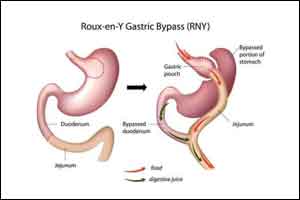- Home
- Editorial
- News
- Practice Guidelines
- Anesthesiology Guidelines
- Cancer Guidelines
- Cardiac Sciences Guidelines
- Critical Care Guidelines
- Dentistry Guidelines
- Dermatology Guidelines
- Diabetes and Endo Guidelines
- Diagnostics Guidelines
- ENT Guidelines
- Featured Practice Guidelines
- Gastroenterology Guidelines
- Geriatrics Guidelines
- Medicine Guidelines
- Nephrology Guidelines
- Neurosciences Guidelines
- Obs and Gynae Guidelines
- Ophthalmology Guidelines
- Orthopaedics Guidelines
- Paediatrics Guidelines
- Psychiatry Guidelines
- Pulmonology Guidelines
- Radiology Guidelines
- Surgery Guidelines
- Urology Guidelines
Roux-en-Y Surgery leads to more Fractures than Adjustable Gastric Banding

In a new population-based study, Dr Elaine Wei-Yin Yu at Massachusetts General Hospital, in Boston, Mass and colleagues have compared Roux-en-Y gastric bypass(RYGB) and adjustable gastric banding (AGB) with respect to efficacy and long-term side effects.The researchers have found that RYGB leads to greater improvements in metabolic health than AGB, but RYGB also causes accelerated bone loss and may increase fracture risk.It implies that patients undergoing Roux-en-Y gastric bypass (RYGB) surgery may be at greater risk for non-vertebral fracture than those having adjustable gastric banding (AGB), a new population-based study reports. The results have been presented at ENDO 2018, the 100th annual meeting of the Endocrine Society in Chicago, Ill.
"Bariatric surgery procedures, such as RYGB, are highly effective treatments that induce sustained weight loss,” said lead study author Elaine Wei-Yin Yu, M.D. "We found that Medicare patients who received RYGB had more fractures compared to those who received AGB. Importantly, we found that RYGB increased the risk for hip, wrist, and pelvis fractures. RYGB increased fracture risk across all age groups, in men and in women, although the effects were more pronounced among men," said Yu, assistant professor of medicine at Harvard Medical School and director of the Bone Density Center at Massachusetts General Hospital, in Boston, Mass.
Yu and her colleagues investigated the fracture rates among Medicare Parts A, B and D enrollees with severe obesity who underwent either RYGB or AGB surgery between 2006 and 2014.
The researchers analyzed Medicare billing claims data from 50,649 adults (78 percent women). Of these, 35,920 underwent RYGB and 14,729 underwent AGB. The authors compared fracture rates between the two groups, controlling for differences in age, sex, race, geographical location, index date, degree of healthcare utilization, comorbidities, and prescribed medications.
RYGB patients were younger than AGB patients (53 vs 56 years of age), and they were more likely to have diabetes (36 percent vs 32 percent) as well as a shorter average follow-up time (3.1 vs 3.8 years).
A total of 1,109 non-vertebral fractures were reported during follow-up. The estimated incidence rates of non-vertebral fractures per 1,000 person-years were 9.8 in the RYGB group and 7.1 in the AGB group. Age or diabetes status did not affect RYGB-associated fracture risk.
Compared with patients who received banding, those who underwent bypass had a 126 percent increased risk of hip fracture, a 62 percent increased risk of wrist fracture, and a 172 percent increased risk of pelvis fracture. Gastric bypass increased overall fracture risk more dramatically in men (108 percent) than in women (42 percent).
"This research is very relevant given the high prevalence of obesity and increasing utilization of bariatric surgery. Over one-third of adults in the United States are obese, and bariatric surgery procedures have accordingly been increasing in popularity," Yu said. "Long-term skeletal health should be discussed and managed for all patients undergoing bariatric surgery. . . These data also emphasize the importance of devising therapies that can counteract fracture risk after gastric bypass."
The Doris Duke Charitable Foundation funded the study.
Co-author Seoyoung C. Kim has financial relationships with Pfizer, Inc., Roche Pharmaceuticals, Bristol-Myers Squibb, and Merck.

Disclaimer: This site is primarily intended for healthcare professionals. Any content/information on this website does not replace the advice of medical and/or health professionals and should not be construed as medical/diagnostic advice/endorsement or prescription. Use of this site is subject to our terms of use, privacy policy, advertisement policy. © 2020 Minerva Medical Treatment Pvt Ltd